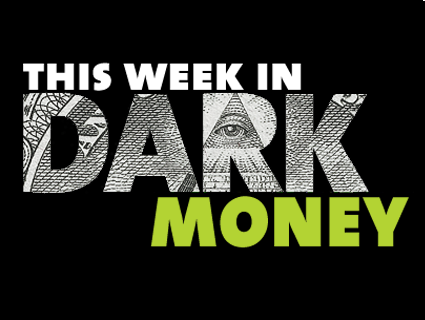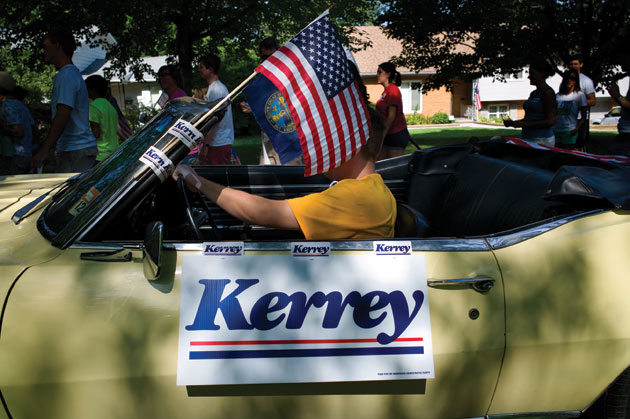A Government Integrity Fund ad supporting Republican Senate candidate Josh Mandel.
This story first appeared on the ProPublica website.
In May, a previously unknown group started pouring money into Ohio’s US Senate race, considered one of the most important in the country and currently the nation’s most expensive. The group, the Government Integrity Fund, has spent over $1 million so far on TV ads bashing Democratic incumbent Sen. Sherrod Brown and praising his Republican opponent, Josh Mandel.
Like many other such non-profit groups that are playing a dominant role in this year’s elections, the Government Integrity Fund is shrouded in mystery. It isn’t required to reveal donors, nor has it answered questions about who runs the group. The Fund’s barebones website lists no contact information beyond a P.O. Box.
The only name listed on incorporation papers for the group is a Columbus lawyer, William Todd, who told ProPublica, “I really have no role in their affairs.” (In June, Todd also declined to respond to questions from a Huffington Post reporter, citing attorney-client privilege.)
But previously unreported documents filed with an Ohio television station pull back the curtain a bit: the Government Integrity Fund is run by a state lobbyist who in turn employs a former top Mandel staffer.
The lobbyist, Tom Norris, is listed as the Government Integrity Fund’s chairman and treasurer. Norris owns an Ohio lobbying firm, Cap Square Solutions, and last year hired a top Mandel aide, Joel Riter, to work at the firm.
Riter’s role in the Government Integrity Fund, if any, is not clear. The former Mandel aide declined to say whether he is involved with the group that is chaired by his current boss and running ads in support of his former boss.
“I can’t talk to you about this,” he told ProPublica. “I’m not going to comment on any kind of involvement I have with anyone.”
Norris did not respond to requests for comment, nor did the Mandel campaign.
The documents identifying Norris as the chairman of the Fund are public because of a Federal Communications Commission rule requiring TV stations to keep detailed records about political advertisers. The files can be valuable, offering a look at exactly who is spending and how much. Until recently, the documents were only available by physically traveling to stations. ProPublica‘s Free the Files project has spotlighted the issue and this summer the FCC passed a rule requiring the stations in the nation’s top markets to upload the files to a government website.
The documents were filed with a Cincinnati NBC affiliate, WLWT, one of the stations the group has been advertising on. Here is a Fund ad that attacks Senator Brown for purportedly turning his back on his younger, more honorable self. “Young Sherrod Brown was independent of Wall Street,” the announcer says. “Today Sherrod Brown takes big money from those same corporate interests.”
The Associated Press reported last month that outside groups have spent $15 million supporting Mandel compared to about $3 million on the Democratic side.
We still don’t know who is putting up the money for the Government Integrity Fund’s ads because the group is a non-profit “social welfare” group, which don’t have to release donor information or register with the Federal Election Commission. Such groups are supposed to be “primarily” engaged in promoting social welfare but they have been flooding the airwaves with political ads in the wake of the Supreme Court’s Citizens United case and decisions by regulatory agencies.
Besides identifying Norris as the chairman of the group, the form filed with the TV station shows that the Government Integrity Fund has an office at 208 East State Street, a few blocks from the state house in Columbus. Riter, the former Mandel aide, also has an office in the building.
Asked about his office at 208 East State Street, Riter said: “Whatever office Government Integrity Fund has is not mine.”
Outside groups are not allowed to coordinate with campaigns, but it is common for politicians’ former aides to be involved with such groups.
Riter first worked as an aide to Mandel during the candidate’s stint in the Ohio legislature. Riter then became field director for Mandel’s campaign for state treasurer, joining the treasurer’s office as constituent and executive agency liaison after Mandel won the race. Riter left his state job in the treasurer’s office after six months to become a lobbyist at Cap Square in 2011. According to state records, the firm lobbies for a range of interests, including the Ohio Ready Mixed Concrete Association and medical device companies.
Riter was featured in a Dayton Daily News article earlier this year investigating Mandel’s practice of hiring former campaign workers for state jobs. (That piece led a Democratic legislator to file an ethics complaint against Riter, who has contested the charges.)
The Fund was created in May 2011 and an affiliated super PAC, the Government Integrity Fund Action Network, registered with the Federal Election Commission two months later.
The super PAC, which does have to report its donors, has not been active and raised just $10,500 through the end of June, all but $500 from New York financier and benefactor of conservative causes Roger Hertog. Hertog also gave $5,000 directly to Mandel’s campaign last year. Hertog declined to comment.
Brown campaign spokesman Justin Barasky said that the Government Integrity Fund is the fourth largest outside group on the Republican side in Ohio, behind such national outfits as the Karl Rove-affiliated Crossroads GPS. “We don’t know anything else about them,” he said. “They are the only secretly funded group that is based here.”








